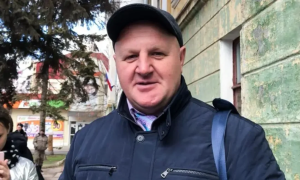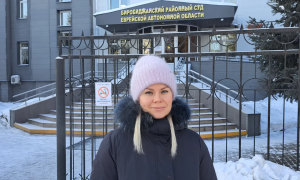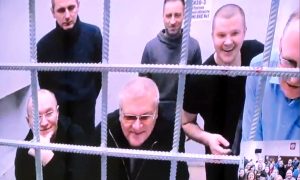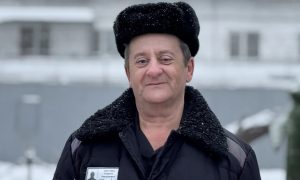For the first time since the Supreme Court ban on Jehovah’s Witnesses as “extremist” in 2017, a Vladivostok court yesterday (22 November) issued an acquittal. Dmitry Barmakin walked free after the Judge cited 28 October Supreme Court amendments which direct judges to ascertain a defendant’s “specific actions”, their motivation, and “the significance [of these actions] for the continuation or resumption of [a banned organisation]’s activities”, rather than rely on generalised claims. The prosecutor could appeal against the acquittal. A 63-year-old teacher Nakiya Sharifullina risks being jailed if Tatarstan’s Supreme Court on 17 December upholds the prosecutor’s appeal against her suspended sentence for allegedly organising a “madrassah”.
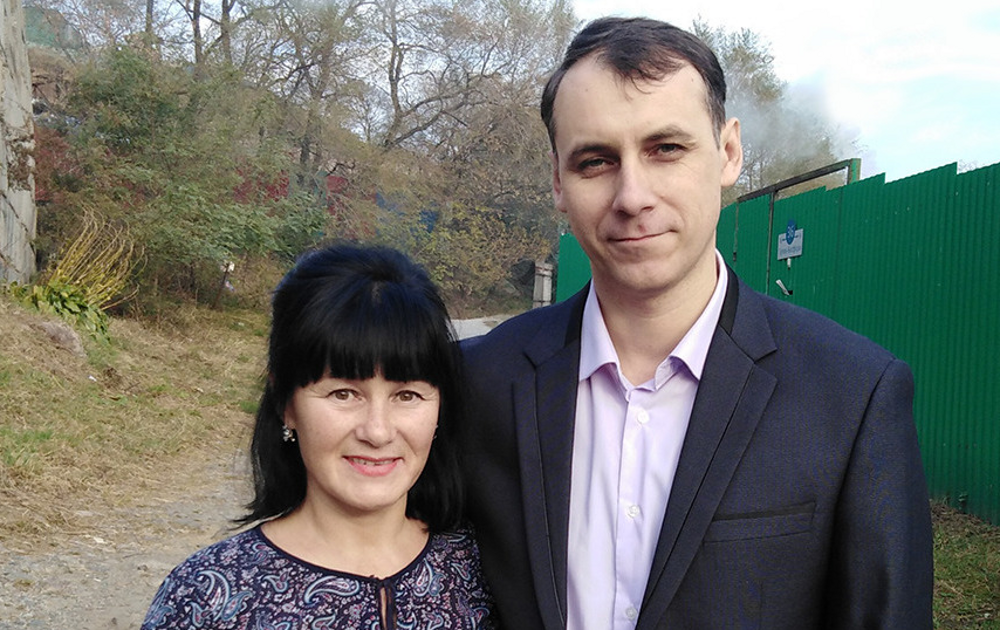
On 22 November, a court in Vladivostok issued the first acquittal of a Jehovah’s Witness on extremism charges since the Supreme Court ordered the liquidation of all Jehovah’s Witness organisations as extremist and prohibited their activities nationwide in 2017.
Vladivostok’s Pervorechensk District Court found Dmitry Barmakin not guilty under Criminal Code Article 282.2, Part 1 (“Organising the activities of a banned extremist organisation”) on the basis of the Supreme Court’s decree on the application of the Extremism Law (including Article 282.2, under which many Jehovah’s Witnesses and Muslims have been convicted). The acquittal verdict will come into force on 3 December, if prosecutors decide not to appeal (see below).
The Plenum of the Supreme Court issued amendments to this decree less than a month ago which explicitly direct judges to ascertain a defendant’s “specific actions”, their motivation, and “the significance [of these actions] for the continuation or resumption of [a banned organisation]’s activities”, rather than rely on generalised claims (see below).
Judge Stanislav Salnikov noted that “the motives for committing these crimes [under Article 282.2] are subject to proof”, adding that “such motives in this case have not been proven”. He decided that Barmakin “must be acquitted due to the absence of a crime in [his] actions”.
“In its verdict, the court emphasised what Jehovah’s Witnesses have been trying to convey to the public during all these years of persecution for their faith in Russia: that the religious activities of Jehovah’s Witnesses, by their very nature, cannot pose any threat to society and the state,” Jehovah’s Witness spokesperson Yaroslav Sivulsky commented on the jw-russia.org news website on 22 November. “I would like to believe that this verdict is only the first of many decisions in similar cases.”
The Supreme Court amendments also note that, after an organisation is banned as extremist, a person’s subsequent exercise of freedom of religion or belief, “including through individual or joint confession of faith and the performance of services or other religious rites and ceremonies”, is not a crime under Criminal Code Article 282.2, Part 2, “if they do not contain signs of extremism”. It remains to be seen how judges will implement these changes (see below).
“This was not the best result, but something,” Alexander Verkhovsky of the Moscow-based SOVA Center told Forum 18 about the Supreme Court amendments. He added that not only judges, but prosecutors and investigators should also take note of the amendments, and expressed hope that further acquittals will follow. “Although we now have one precedent, it is not a precedent,” he warned (see below).
In August 2021, a 63-year-old teacher from Tatarstan Nakiya Sharifullina received a two-year suspended sentence for allegedly organising a “madrassah” in which the works of Turkish theologian Said Nursi were discussed. Both her and the prosecutor’s appeals against the sentence are due to be heard on 17 December and she still faces the risk of being jailed. Forum 18 asked Tatarstan’s Prosecutor’s Office in writing why it had appealed against the sentence. Forum 18 has received no response (see below).
A court is still considering whether to ban as extremist 47 books seized from Sharifullina and other women whose homes were raided in March 2020 (see below).
A court in Dagestan has closed criminal cases against other alleged readers of Nursi’s works, but the Investigative Committee announced that another had been launched against another Muslim there (see below).
Rising number of prosecutions
Before Barmakin’s acquittal, 146 Jehovah’s Witnesses had been convicted of “organising” or “participating in” the activities of their liquidated and outlawed local religious organisations. Courts had so far issued 14 fines, 88 suspended sentences and 44 prison terms (though several court decisions have not yet come into force, as appeals are still pending).
On 25 October, an Astrakhan court handed four Jehovah’s Witnesses some of the longest prison terms yet given. Three of them received eight-year jail terms.
Eighty-year-old Yelena Savelyova from Tomsk Region received a four-year suspended sentence as recently as 17 November.
The full effects of the amended Supreme Court decree remain to be seen. The number of prosecutions across Russia under “extremism” laws for exercising freedom of religion or belief is still rising. More than 540 Jehovah’s Witnesses are under investigation, are on trial, or have been convicted as a direct result of the Supreme Court’s 2017 liquidation of their national-level Administrative Centre near St Petersburg and its subsidiaries, and the consequent ban on their activities throughout the country.
Courts have convicted two other Jehovah’s Witnesses of “continuing the activities” of the local Jehovah’s Witness religious organisation in Oryol, which was liquidated as “extremist” in 2016, before the nationwide ban. One of them – Danish citizen Dennis Christensen – has been imprisoned.
Apart from Barmakin, only three other Jehovah’s Witness have been acquitted – in these cases, of “extremism”-related offences unconnected to the 2017 ban.
Muslims who meet to study the writings of Turkish theologian Said Nursi may also be prosecuted under the Extremism Law for organising or participating in the activities of “Nurdzhular”. This organisation was banned as “extremist” in 2008, but Muslims in Russia deny any such formal organisation ever existed. Typically, such Muslims meet in homes to study Islam, with one or more expounding on Nursi’s works. They also pray, eat, and drink tea together, and do not seek state permission to meet.
No trials are currently underway of Muslims who met to study Nursi’s works, but four people in Dagestan and Tatarstan appear to be facing criminal prosecution.
At present, only one person who met with others to read Nursi’s works remains imprisoned. A court in Dagestan sentenced Ilgar Vagif-ogly Aliyev (born 16 February 1977) in May 2018 to eight years’ imprisonment plus two years of restrictions on freedom for alleged involvement in “Nurdzhular”.
Courts in Russian-annexed Crimea and Sevastopol have also sentenced Jehovah’s Witnesses and Muslims to imprisonment for exercising their freedom of religion and belief.
Charges and punishments
After being kept under FSB security service or police surveillance for some months, most targeted Jehovah’s Witnesses and Muslim readers of Nursi’s works are prosecuted for “organising” (Criminal Code Article 282.2, Part 1), or “participating in” (Part 2), “the activity of a social or religious association or other organisation in relation to which a court has adopted a decision legally in force on liquidation or ban on the activity in connection with the carrying out of extremist activity”.
The manifestations of freedom of religion and belief being prosecuted under both these parts of Criminal Code Article 282.2 are similar. They include meeting in each other’s homes to pray and sing together, study sacred texts, and to discuss shared beliefs. “There is no logic” to current sentencing patterns, Jehovah’s Witness lawyers commented to Forum 18 on 29 October. At the same time, a trend appears to have been growing throughout 2021 towards jail sentences under Article 282.2, Part 2.
There is a wide range of compulsory and discretionary punishments – including post-imprisonment punishments – for convictions under Criminal Code Article 282.2. A similarly wide range of punishments exists for convictions under Criminal Code Article 282.3, Part 1 (“Financing extremist activity”), as well as under Criminal Code Article 282.2, Part 1.1 (“Inclination, recruitment or other involvement of a person in an extremist organisation”).
These punishments vary depending on the articles under which a conviction takes place, and whether a sentence is a prison sentence, suspended prison sentence, fine, or assigned labour sentence. Such punishments include bans on holding certain positions and/or carrying out certain activities, restrictions on freedom, and administrative supervision.
The state of “sudimost” (having an active criminal record, the state of being a convicted person) also brings with it formal penalties and informal obstacles to life, as does being on the Rosfinmonitoring “List of Terrorists and Extremists”.
Vladivostok: First acquittal
One of the longest-running criminal prosecutions of a Jehovah’s Witness in Russia has ended in acquittal after nearly two and a half years – the first acquittal since the Jehovah’s Witness Administrative Centre and its subsidiary organisations were outlawed as extremist in 2017 and their activities banned across the country. The verdict in Dmitry Barmakin’s case will come into force on 3 December 2021, if prosecutors decide not to appeal.
Prosecutors had requested a nine-year jail term plus one year of restricted freedom. (The maximum penalty under this Article is ten years’ imprisonment.)
In his verdict, cited by the jw-russia.org news website on 22 November, Judge Stanislav Salnikov stated that he was “convinced that both for every person in general and for every Jehovah’s Witness believer, attending collective services, providing premises for holding them, reading and discussing religious literature, disseminating religious beliefs, observing religious rites and ceremonies, performing spiritual songs, [and] praying are forms of lawful behaviour that are part of freedom of conscience and freedom of religion .. Conducting Jehovah’s Witness religious rituals in residential or commercial premises .. does not violate the law, but is the exercise of the rights of believers to freedom of conscience and religion”.
SOVA Center noted the first use in court of the amended Supreme Court Decree. “We welcome the decision of Judge Salnikov, who showed consistent commitment to the observance of the constitutional right to freedom of religion during the trial of Dmitry Barmakin,” it stated on 22 November.
2018 arrest, 447 days in pre-trial detention
Investigative Committee officials and armed officers arrested Dmitry Viktorovich Barmakin (born 30 May 1974) and his wife Yelena Mikhailovna Barmakina (born 9 October 1967) on 28 July 2018 at the home of Yelena’s 90-year-old grandmother in the Primorye Region town of Nakhodka. Yelena was released after questioning, but investigators kept Dmitry in detention for 447 days before releasing him under specific restrictions on 18 October 2019, after his trial under Criminal Code Article 282.2, Part 1 had already begun.
After 21 hearings in 2019 and 2020, Judge Salnikov returned Barmakin’s case to prosecutors, pointing out that their indictment did not indicate the extremist nature of Barmakin’s actions, but only described religious worship, during which, in Barmakin’s words in court, he “sang songs with fellow believers, discussed the Bible with them, and prayed to Jehovah God”.
There were a further five hearings after Primorye Regional Court overturned the judge’s decision in April 2021 and sent the case back to continue to be heard by him.
On 22 November, Judge Salnikov concluded that Barmakin had “never carried out extremist activity – he professed the religion of Jehovah’s Witnesses, including meeting fellow believers and discussing his beliefs with them”.
The Judge noted: “The rights associated with freedom of religion must be ensured regardless of whether a person is a member of a religious organisation or not, and therefore the right to profess the faith of Jehovah’s Witnesses must be ensured even after the decision of the Supreme Court of Russia of 20 April 2017.”
Investigators had Dmitry Barmakin added to the Rosfinmonitoring “List of Terrorists and Extremists” on 14 February 2019. His name should be removed from this shortly after his acquittal enters legal force.
Barmakin’s wife Yelena Barmakina was also tried under Criminal Code Article 282.2, Part 2 at Pervorechensk District Court. On 29 September 2020, however – the day the verdict was due – Judge Olga Barabash decided to return her case to prosecutors, again noting that “from the text of the indictment, it is not possible to establish the extremist orientation of the defendant’s actions”.
Barmakina’s case now appears to have been attached to that of eight other Jehovah’s Witnesses in Vladivostok charged under either Article 282.2, Part 2 or Part 1. A further 29 Jehovah’s Witnesses in Primorye Region have also faced prosecution, two of whom have received suspended sentences.
Will change to application of Extremism Law provide basis for acquittals?
On 28 October, the Plenum of the Supreme Court in Moscow issued amendments to the Court’s 2011 Decree “On judicial practice in criminal cases concerning extremism offences”, which instructs judges on how to apply the Extremism Law.
While ostensibly aimed at preventing the incitement of violence and hatred on racial, religious, and social grounds, the 2002 “Extremism” Law and associated articles of the Criminal and Administrative Codes are regularly used against religious communities and individuals for beliefs and practices which do not violate the human rights of others.
Part of the Decree governs the application of Criminal Code Article 282.2 (“organising” (Part 1), or “participating in” (Part 2), “the activity of a social or religious association or other organisation in relation to which a court has adopted a decision legally in force on liquidation or ban on the activity in connection with the carrying out of extremist activity”). This now explicitly directs courts to ascertain a defendant’s “specific actions”, their motivation, and “the significance [of these actions] for the continuation or resumption of the [banned organisation]’s activities”.
The amendments also note that, after an organisation is banned as extremist, a person’s subsequent actions “consisting solely of the exercise of their right to freedom of conscience and freedom of religion, including through individual or joint confession of faith and the performance of services or other religious rites and ceremonies, do not in themselves constitute a crime under Article 282.2, Part 2, if they do not contain signs of extremism”.
The amendments state that if a person is considered to be the leader or organiser of a banned extremist organisation, then any recruitment of others to that organisation they may have carried out is covered by the Article 282.2, Part 1 charge. The person should not also be charged under Part 1.1 (“Inclination, recruitment or other involvement of a person in an extremist organisation”). The possibility of double charges under Part 2 and Part 1.1 nevertheless remains.
The amendments – and Barmakin’s acquittal – appear to suggest that meeting to pray, sing hymns, and study religious texts should not in itself be considered “continuation of the activities of a banned extremist organisation”.
The decrees of the Supreme Court Plenum are aimed at ensuring uniform application of the law across all courts, so all judges should now apply these amendments in the hundreds of criminal cases ongoing across Russia. Whether prosecutors will now take more trouble to show “signs of extremism” or “extremist” motivation in the actions of Jehovah’s Witnesses and Muslims who read Nursi’s works remains to be seen.
It is also unclear whether the amendments will come into play only when a case is considered in court, or whether it will also have any effect on investigators’ and prosecutors’ decisions to pursue criminal cases against individuals. Even if they are ultimately acquitted, people under investigation may still face detention or house arrest, inclusion on the Rosfinmonitoring “List of Terrorists and Extremists”, and the stress of a trial.
Similarly, it is unclear how the amendments may be applied to those Jehovah’s Witnesses and Muslims who read Nursi’s works whose sentences have already come into force.
Alexander Verkhovsky of the Moscow-based SOVA Center, which tracks misuse of anti-extremism laws, was in the ad hoc Working Group the Supreme Court convened before it adopted the Decree. “This was not the best result, but something,” he told Forum 18 from Moscow.
Verkhovsky said that not only judges, but prosecutors and investigators should also take note of the amendments, and expressed hope that further acquittals will follow. “Although we now have one precedent, it is not a precedent,” he warned.
“We hope that all Russian courts, when passing decisions on cases concerning Jehovah’s Witnesses, will be guided by the ruling of the Plenum of the Supreme Court of Russia,” Jehovah’s Witness Yaroslav Sivulsky commented on 22 November.
Since the Supreme Court issued its amendments on 28 October, courts in Russia have convicted one Jehovah’s Witness and upheld one guilty verdict. Investigative Committee, FSB security service, and National Guard officers have continued to raid Jehovah’s Witness homes.
Naberezhnyye Chelny: Appeal pending
A 63-year-old woman in Tatarstan, Nakiya Khametzakirovna Sharifullina (born 1 January 1958), remains at risk of being sent to prison after prosecutors challenged the suspended sentence she received for allegedly participating in the activities of “Nurdzhular”.
Naberezhnyye Chelny City Court found Sharifullina guilty on 31 August 2021 under Criminal Code Article 282.2, Part 2. The Judge handed her a two-year suspended sentence with a probationary period of 18 months and no restrictions on freedom. Prosecutors had requested a prison term of seven years.
Prosecutors submitted their appeal on 10 September, according to the city court website. Sharifullina’s lawyer Ruslan Nagiyev has also lodged an appeal against her conviction on her behalf. Tatarstan’s Supreme Court is due to consider both appeals on 17 December, according to its website.
On 19 November, Forum 18 asked Tatarstan’s Prosecutor’s Office in writing why it had appealed against the sentence imposed on Sharifullina. Forum 18 received no response by the end of the working day in Tatarstan of 23 November.
According to Naberezhnyye Chelny City Court’s ruling placing Sharifullina under house arrest on 25 March 2020, seen by Forum 18, Sharifullina allegedly organised a “madrassah”, which met in several flats in Naberezhnyye Chelny on a range of dates in March and April 2019, as well as on “other days” since 2017. Members of the group studied the Koran and the Turkish language, as well as Nursi’s “Risale-i Nur” (“Messages of Light”) collection, his “Letters”, and “A way to positive service” (all banned and placed on the Justice Ministry’s Federal List of Extremist Materials).
In comments on his Facebook page in late August, shortly before the sentencing hearing, lawyer Ruslan Nagiyev noted that Sharifullina, who has “a number of serious illnesses”, had denied any guilt throughout and insisted that she had done “nothing apart from study the Koran”.
As she awaits her appeal hearing, Sharifullina remains subject to the travel restrictions she has been under since she was released from house arrest in late November 2020.
According to Article 389.20 of the Criminal Procedural Code, criminal appeal courts may come to one of ten conclusions, depending on the original verdict and which side has challenged it. In Sharifullina’s case, with a guilty verdict and both defence and prosecution appeals, the possibilities include: leaving the conviction and sentence unchanged; full acquittal; sending the case back for re-examination in the first-instance court; and a change to the sentence (but not the conviction).
Appeals occasionally change sentences
A sentence can be made either lighter or harsher at appeal, although both outcomes have so far been rare in cases involving people prosecuted for exercising freedom of religion and belief. It is unknown whether the Supreme Court’s amended decree on applying the Extremism Law will have any effect on Sharifullina’s case.
A few Jehovah’s Witnesses have succeeded in having fines reduced and prison sentences suspended and/or shortened.
Appeals occasionally lead to increased sentences. Jehovah’s Witness Sergey Mysin saw his four-year suspended sentence increased to four and a half years when an appeal judge overturned the lower court’s decision to recategorise the offence with which he had been charged. The vast majority of appeals, however, are unsuccessful.
In Russian-annexed Crimea, Jehovah’s Witness Artyom Gerasimov’s 400,000 Rouble fine was changed to a six-year prison term (with no re-trial) when prosecutors appealed against the original verdict’s “mildness” in June 2020.
A similar prosecution appeal against the “excessive leniency” of a fine handed down to Muslim Andrey Dedkov nevertheless failed in Krasnoyarsk in October 2018.
Appeal courts have not changed any of the prison sentences imposed on Muslims who met to study Nursi’s works.
At present, 40 Jehovah’s Witnesses (and no other Nursi readers) who have been convicted under various Parts of Criminal Code Article 282.2 and Article 282.3 are awaiting appeal. Several others whose convictions have now come into force are appealing further at the cassational level.
Literature banning case ongoing
Naberezhnyye Chelny City Court is still considering whether to ban as extremist 47 books seized from Sharifullina and other women whose homes in the city were raided in March 2020. Proceedings were re-started on 19 October 2021 when more publishers were made parties to the case. Two hearings have so far taken place, on 8 and 19 November. It is unknown when the next is due.
The court ruled that the books – almost all in Turkish and by the late Turkish Muslim theologian Said Nursi – should be prohibited as extremist on 19 April 2021. Tatarstan’s Supreme Court overturned this decision on 9 July 2021 and sent the case back for re-examination.
The Supreme Court’s panel of three judges agreed with lawyer Ruslan Nagiyev’s arguments that the case materials should have included Russian translations of the books, and that the city court should have taken into account the European Court of Human Rights judgment in the case of Ibragimov and Others v. Russia (Application Nos. 1413/08 and 28621/11). This found that Russian bans on Nursi’s works violated Article 10 of the European Convention on Human Rights (freedom of expression).
Criminal cases closed, another started
On 7 September, Judge Nurbagand Nurbagandov of Izberbash City Court in Dagestan closed the criminal cases against Kazbek Zapirov and Mukhram Akhmedov, according to the decisions on the court website. Both were accused under Criminal Code Article 282.2, Part 2 of participating for more than a decade in meetings to study their faith which prosecutors interpreted as carrying on the activity of Nurdzhular.
The court decisions said both men had “repented” and had informed the authorities of their activities.
The court similarly closed criminal cases against five other unnamed individuals between 7 September and 3 November. On 28 October, Dagestan’s Investigative Committee announced that it had launched a criminal investigation under Article 282.2, Part 2 against another unnamed Muslim who reportedly met with others to study Nursi’s works.
A note appended to Article 282.2 of the Criminal Code states: “A person who has committed a crime under this article for the first time and has voluntarily stopped participating in the activities of a public or religious association or other organisation [banned as extremist], shall be exempted from criminal liability if their actions do not constitute a different offence.
Elderly Jehovah’s Witness’ early release denied
Seventy-year-old Valentina Baranovskaya, who was convicted in February and appealed unsuccessfully in May, is currently incarcerated in Correctional Colony No. 28 in Ust-Abakan, just outside her home city of Abakan (Khakasiya Republic). She is due to be released on 10 January 2023.
On 18 October 2021, Ust-Abakan District Court refused her request for early release on the grounds of ill health (as permitted by Article 81 of the Criminal Code).
Shortly before her trial began in July 2020, Baranovskaya suffered a stroke and was hospitalised. She was sentenced to imprisonment despite her age and documented poor health.
According to her lawyers, she is receiving appropriate care in prison: “The duty doctor has visited Valentina in the labour camp and issued his conclusions,” they stated to the jw-russia.org news website on 20 October. “The administration of the camp agreed with him – they give her everything that is prescribed, [and] treat her every day. The therapist and the head of the medical unit treat her well. The treatment is doing her good.”
Abakan City Court convicted Baranovskaya and her son Roman Lyubomirovich Baranovsky (born 27 June 1974) under Criminal Code Article 282.2, Part 2 and Part 1 respectively on 24 February 2021. Roman received a six-year prison term which he is currently serving at Transbaykal Region Correctional Colony No. 3 near Chita, more than 2200 km from Abakan. He is due to be released on 10 January 2027.
The Baranovskys appealed unsuccessfully against their convictions at the Supreme Court of the Khakasiya Republic on 24 May 2021 and at the 8th Cassational Court in Kemerovo on 14 October 2021.
Baranovskaya was the oldest Jehovah’s Witness and the first woman to be jailed to punish her for exercising freedom of religion or belief. Three other women who received jail terms – Tatyana Shamsheva, Olga Silayeva, and Alevtina Bagratyan – were not sent to a prison camp as they had already served the time in detention or under house arrest. The fifth woman to receive a jail sentence – and the second likely to spend time in a prison camp – is fellow Jehovah’s Witness Olga Ivanova. Trusovsky District Court in Astrakhan handed Ivanova a prison term of three years and six months on 25 October. (END)
